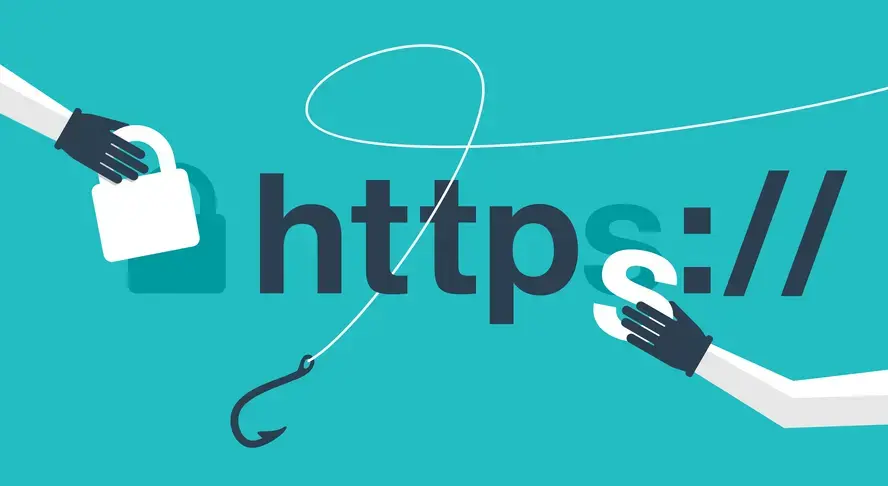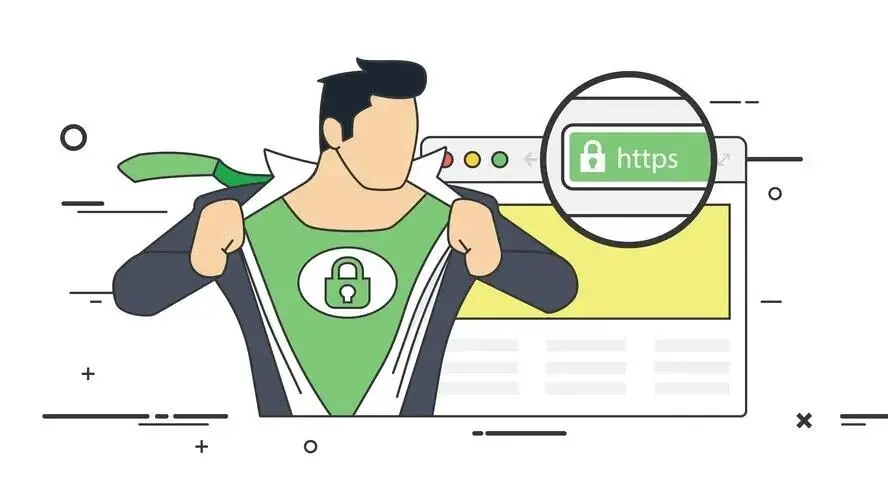You've likely seen "HTTPS" in your browser's address bar, but do you know what it means?
It's easy to overlook, but URLs typically begin with either HTTPS (https://) or HTTP (http://)
If you’re interested in learning about internet security, consider this to be your first lesson.
What Is HTTP?
HTTP (Hypertext Transfer Protocol) is a set of rules for transferring files like text, images, and videos on the web.
The protocol operates in the background when you use a web browser. It is built on TCP/IP protocols, which are the foundation of the Internet.
What Is HTTPS?
HTTPS (Hypertext Transfer Protocol Secure) secures online communication with encryption protocols.
It was previously called Secure Sockets Layer (SSL) and is now known as Transport Layer Security (TLS).
HTTPS adds integrity, authentication, and encryption to the HTTP protocol.
What Is the Difference Between HTTPS and HTTP?
| Feature | HTTP | HTTPS |
|---|---|---|
| Security Certificate | Lacks SSL certificate. | Includes SSL certificate for enhanced security. |
| Data Vulnerability | Data like credit card details are vulnerable. | Protects submitted data from interception. |
| Data Encryption | No encryption between browser and server. | Encrypts data sent between browser and server. |
| Server Authentication | Does not verify the server. | Verifies the server and prevents data tampering |
| Main Benefits | Basic web communication | Offers data protection, encryption, and server authentication. |
Beyond the Basics: Advanced Features of HTTPS
HTTPS is a multifaceted tool offering advanced security and functionality features for web communications, including:
- Perfect Forward Secrecy (PFS): Ensures session-specific encryption keys, protecting past communications even if future keys are compromised.
- HTTP Strict Transport Security (HSTS): Forces modern web browsers to use secure HTTPS connections, preventing downgrade attacks and cookie hijacking.
- OCSP Stapling: Checks the revocation status of digital certificates efficiently, enhancing transaction speed and privacy.
- Public Key Pinning: Defends against impersonation by specifying which cryptographic keys belong to the server.
- Extended Validation Certificates: Provides higher trust levels by verifying the legal entity of the site owner, often indicated by a green company name in the browser's address bar.
Why Your Website Needs HTTPS

Good for SERP Ranking
- HTTPS boosts Search Engine Optimization (SEO).
- Not being number one on search engines like Google may be due to SEO.
- SEO involves optimizing HTTPs websites to rank higher on search engines.
- Google, a major search engine, uses HTTPS as a ranking factor.
User Satisfaction
HTTPS not only benefits your company but also ensures your customers' data is safe.
It's crucial for maintaining trust, as most won't deal with brands where their personal or financial information is at risk.
It protects sensitive data like credit card numbers, passwords, and even browsing history.
SSL Is Required for AMP
For a better-performing website on mobile devices, HTTPS is critical.
- AMP (accelerated mobile pages) requires HTTPS for faster mobile content loading.
- Mobile search rankings increasingly prioritize HTTPS.
- HTTPS is crucial for a mobile-friendly site.
Google Is Indexing Mobile
With the increasing importance of mobile search rankings, HTTPS is necessary.
Google now mainly uses a site's mobile version for indexing and ranking, as most searches come from mobile devices.

Web Security
HTTPS is vital for enhancing your website's security and user trust.
- Provides encrypted communication, essentially armoring data collected by your site.
- Adequate for browsing simple content like images or articles.
- Essential for sensitive activities like entering credit card details or logging into bank accounts.
Limited Browser Warnings
Without HTTPS, visitors will see a warning in the address bar indicating that your site is not secure. These messages can be annoying and unpleasant to look at.
The Impact of HTTPS on SEO
In 2014, Google stated that HTTPS could tip the scales in favor of one website over another in equally ranked search results.
A secure HTTPS site with an SSL certificate is favored if all other SEO factors are equal.
Google has urged website owners to switch to secure sites, as SSL enhance competitiveness in their industries.
HTTPS also boosts SEO by offering a better user experience — insecure site warnings can drive visitors away, particularly from e-commerce or personal information collection sites.
This lack of trust can significantly increase bounce rates and reduce time spent on the site.
At Verpex, we provide various hosting plans to fit your needs, including free SSL certificates and numerous development resources.
The Role of HTTPS in Mobile App Security

HTTPS plays a vital role in the mobile ecosystem, encrypting data between apps and servers to protect personal and sensitive information.
It ensures data integrity and server authenticity, safeguarding against alterations and man-in-the-middle attacks.
This security protocol also securely transmits authentication tokens and shields against eavesdropping, crucial for protecting users' data over multiple network connections.
How to Set Up HTTPS for Your Website
For a new website, all you need to do is set up with HTTPS.
Choose a hosting provider like Verpex that supports the latest TLS and HTTP protocols and assists you throughout. We handle the technical side, letting you focus on your business.
- It's crucial to implement HSTS as the final step after setting up HTTPS.
- If you're struggling to enable HTTPS on an existing website, you might have made errors.
- Check for HTTPS-related mistakes, such as ensuring all website pages and internal links are HTTPS-secured, and update your open graph and canonical tags to HTTPS.
- Transitioning from HTTP to HTTPS can vary in time and complexity, depending on your technical skills, hosting, CMS type, and your website's size and complexity.
Small businesses using popular CMS with robust hosting, like Verpex, tend to find the migration smoother, and we're ready to help with this process.
Addressing Common HTTPS Issues
Maintaining HTTPS security requires vigilance against common pitfalls, including:
Expired Certificates: Monitor and renew certificates before they expire to avoid browser warnings and maintain user trust.
Mixed Content Warnings: Ensure all content on secure pages is delivered over HTTPS to prevent warnings and layout issues.
Incorrect Redirection: Direct all redirects to HTTPS pages and use HTTP Strict Transport Security (HSTS) to enforce a secure HTTP connection.
Weak Encryption Algorithms: Regularly update to strong encryption methods and disable outdated ones for enhanced security.
Certificate Name Mismatch: Ensure your SSL certificate name matches your domain to avoid browser warnings. Reissue if necessary.
Conclusion
In short, to succeed in today's digital world, a secure, encrypted website is essential.
Security not only ensures visitor comfort but also protects sensitive information.
With the internet's vast user base and growing demand, a complete shift from HTTP to HTTPS is imminent.
But remember, after adopting HTTPS, stay updated with the latest security and web performance trends to maximize its benefits.
Frequently Asked Questions
Will HTTPS affect my site performance?
Yes. SSL impacts the site performance since it takes extra round trips to establish a secure connection. But, the increased level of security is worth the wait of a few milliseconds.
Why should I get an SSL certificate?
You need an SSL certificate to convey trust to users, prevent attackers, verify ownership of your website, and keep your user data secure.
How HTTPS is important?
HTTPS is important because It protects customer and communication information. Businesses that use HTTPS can also be verified, since HTTPS works to legitimize any site.
Are HTTPS urls encrypted?
Information between a web service and a client is encrypted through HTTPS.
Does HTTPS expire?
SSL certificates now expire after 13 months, making them invalid and leaving communications unprotected.

I've been navigating the web hosting waters for years now. As the Chief Editor at Verpex, I team up with some awesome writers to dish out the good stuff on hosting. Got a Master's in Journalism, so I always have an eye out for quality. Whether you're just dipping your toes or you're a seasoned surfer, I'm here to make everything web hosting feel like a breeze
View all posts by Julia Lozanov




















